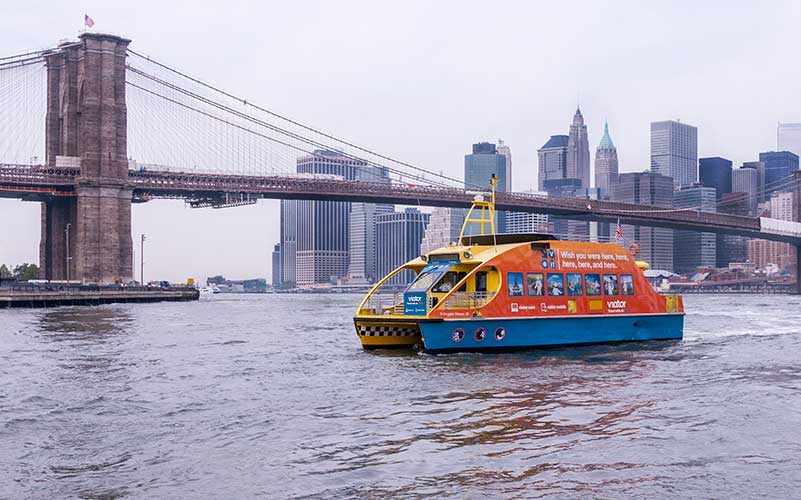
CLF has partnered with New York Cruise Lines, Inc., to reduce diesel emissions in the air by swapping out old, ineffective marine engines. Photo: New York Cruise Lines, Inc.
Every day, hundreds of vessels can be seen moving in and out of their berths in the New York Harbor. This marine traffic is an important part of the history and economy of the Northeast.
However, many larger marine vessels are equipped with diesel engines that last 30 years or more. They don’t keep pace with new technologies that can reduce air particulate emissions in the environment. One way to address this issue is to replace the old, inefficient diesel engines on marine vessels with new ones that meet more stringent EPA standards. But these new engines are expensive to buy and retrofit, leaving them financially out of reach for many companies.
Through our long-time relationship with the Environmental Protection Agency (EPA), CLF has forged partnerships with maritime companies to leverage a creative funding solution: the EPA’s Diesel Emissions Reduction Act (DERA). This act authorizes the EPA to provide grants and loans for projects that reduce emissions from existing diesel engines. Our latest project is underway now and will help make the air in New York and New Jersey cleaner for all.
Creative Funding Solutions to Reduce Emissions
In 2020, CLF was awarded a DERA grant to partner with New York Cruise Lines, Inc. Through its two subsidiaries, New York Water Taxi and Circle Line Sightseeing Cruises, the company serves 2.5 million passengers annually in New York and New Jersey through a combination of local ferries and sightseeing cruises. The DERA grant will help pay for 12 new propulsion and auxiliary engines for two ferries and three excursion vessels. The total cost of replacing these engines is over $1.8 million.
Through the Diesel Emissions Reduction Act, the EPA is providing $736,400 of that cost, while New York Cruise Lines, Inc., will cover the remaining $1.1 million. This public-private partnership or “cost-sharing” approach makes replacing inefficient engines a more affordable undertaking for the company.
Cleaner Engines Mean Better Air Quality, Better Health
This is CLF’s seventh DERA grant since 2011 and adds to our track record of finding creative, market-based solutions to address environmental concerns. Swapping out diesel engines helps vessels run more efficiently, significantly extends their life, and provides an economic boost to the boats’ owners. These improvements help the owners stay competitive in an industry with razor-thin profit margins.
Most importantly, the new engines improve air quality for New York and New Jersey residents by lowering the levels of atmospheric pollutants such as nitrogen oxide, carbon dioxide, and particulate matter. All of these place people at greater risk of serious health conditions, including asthma and respiratory illness.
Emissions from diesel engines also create ground-level ozone – a major contributor to acid rain, which damages crops, trees, and other vegetation. New engines mean less ground-level ozone in the region.
Ultimately, these latest engine swaps with New York Cruise Lines will be as beneficial as removing 17 diesel-combination trucks from roadways. And, the EPA’s Diesel Emissions Quantifier estimates the project will prevent approximately $891,400 in healthcare-related costs attributable to diesel particulate matter.
Public-Private Partnerships a Win-Win for Economy and Environment
CLF partners with community organizations, public and philanthropic agencies, and private investors to better understand environmental challenges and create new solutions. Projects such as retrofitting old, inefficient marine engines would not be possible without this type of creative collaboration. It’s a winning combination for the environment as well as the economy.
CLF’s EPA-funded projects reflect our long-time commitment to boosting clean energy and lowering carbon pollution in coastal communities in the Northeast. We will continue to seek future funding from the EPA’s DERA program, with community-minded partners such as New York Cruise Lines, Inc., to promote clean water and healthy communities for the residents across the region.



